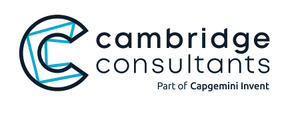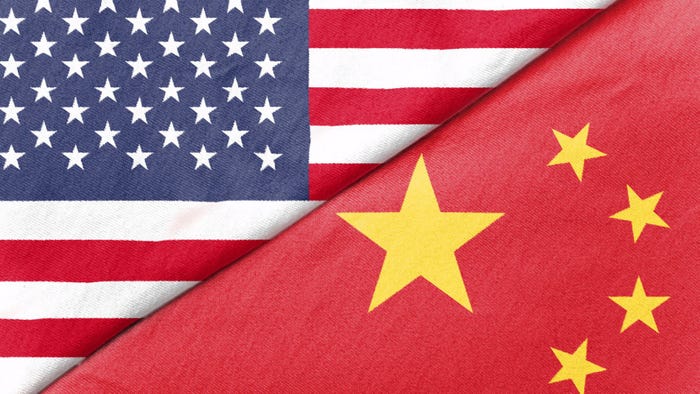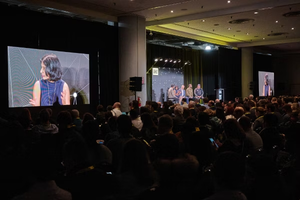Harmonizing Humans and AI: Bridging Vision and Realities
AI has the potential to support us in solving some of humanity’s greatest challenges, but only if we work together.

We are on the cusp of a new technological age with Artificial Intelligence (AI) at the forefront - and what happens next is up to us. While AI dominates headlines and emerging industries alike, we can either fear what lies ahead, or choose to step forward together to meet AI as collaborators, guiding its progress in the right direction to allow us to reach our full potential and solve some of humanity’s most pressing concerns.
The field is currently sat on a very steep exponential curve, with the potential for decades’ worth of progress in AI development to happen over the next few years. This has been most clear in the rise of ChatGPT, a language-based model chatbot created by OpenAI that hit its first one million users within five days of its release in November 2022, and now receives a billion visits a month. Perhaps inevitably, this swift growth has sparked a flurry of ethical concerns: How is AI going to affect jobs? How will it affect us societally? Without stifling innovation, these worries must be addressed for AI to support humanity and continue its progression.
This brings us to the big question: How can we, as a global collective, come together to unlock AI’s vast potential while balancing economic growth, human well-being and planetary sustainability?
The answer, of course, is far from simple – it is many, complex and interconnected. I’ll be taking the stage at Applied Intelligence Live! Austin to further discuss how I believe we can harmoniously bridge the gap between the visions of what an AI-integrated world could mean for humanity and the realities of how to start on this long journey. But, in my view at least, I truly believe we can align the commercial growth of AI with societal impact, both locally and globally.
So, where to start?
Bridging the gap to ethical AI
Visions for what Artificial Intelligence could mean to society have been varied and many. From the theories of early computer scientists to the fantasies of sci-fi authors, the dizzying potential of AI has both inspired and unnerved. All extremes - both positive and negative – have been explored, and yet many of the leading scientific minds of the past reassuringly emphasized messages of hope.
Alan Turing (1912-1954), the father of modern computing science, long foresaw AI reaching human-level intelligence and envisioned a society where humans and AI worked hand in hand, benefiting from a mutual partnership that emphasized ethics and humanity. Similarly, Author and Scientist Isaac Asimov (1920-1992) pictured AI systems governed by the well-known Laws of Robotics, which stated that human beings’ lives, safety and well-being came above all else. Even today, Asimov’s Laws of Robotics provide inspiration and the foundations for the field of AI today.
Of course, visions for an AI-supported future didn’t come without caution. Philosopher and Futurist Nick Bostrom (b.1973) warns of the potential risks of advanced AI, stressing that the alignment of AI goals with human values is vital, while emphasizing the importance of human oversight.
Yet the collective message from these great minds is clear: AI can be a transformative force for good. The caveat to achieve this transformation is that we collectively guide AI’s development to ensure it is created with a foundation of human values and ethics.
It’s worth remembering here that AI can only progress as far as we allow it. Rather than replace us, AI can augment and amplify human potential while we remain firmly in the driver’s seat. We are in control. AI cannot evolve without our intervention. It is therefore our responsibility to create a framework that allows AI to work in harmony with human goals.
So how do we create a world where AI is seen as a benevolent ally rather than a threat?
The first and most critical step is collaboration.
If we’re going to successfully find our way to a long and reciprocal relationship with a human-centric AI, interdisciplinary collaboration is a must. AI can revolutionize many fields. It is our collective responsibility for different disciplines, from governments to business, computer scientists to sociologists, to combine forces and co-create AI solutions. This, I think, will be pivotal in unlocking AI’s full potential. A start has been made on this already, with the UK announcing it will host the first global summit on Artificial Intelligence, bringing experts from around the world together to discuss the implications and best ways to approach the use of AI. From collaborative discussions like these, ethical AI frameworks can be put in place.
The EU’s Ethics Guidelines for Trustworthy AI is a perfect example. As more countries and regions across the world create similar frameworks, such as the work which has already been collated by OECD. AI principles and recommendations can be set on how to ensure AI doesn’t discriminate based on race, gender, or otherwise.
Inspired and informed by these initiatives, my colleagues and I at Cambridge Consultants (CC) have gone more in-depth on ethical AI and AI-assurance blueprint, illustrating how assurance and responsible development can actually accelerate innovation.
In the context of global initiatives, tangible outcomes are driven by partnerships between local governments, AI startups and technology developers. Consider the creation of smart city solutions based on the specific needs of a city. For instance, the UK government could work with AI developers to optimize public transport routes in London, which have very different requirements from Newcastle’s.
Emphasizing local solutions catering to the unique challenges of specific regions gives a more focused goal for AI innovation. With an increasing local population, the agricultural industry faces serious challenges where short-term food production is balanced with long term sustainable growth. Uniquely benefitting from AI solutions, sustainable farming can be supported by AI-driven drones as an extension of human workers, programmed to monitor crops specific to the UK, detecting early signs of disease relevant to the UK climate to give farmers the heads up to act swiftly and avoid crop damage. Encouraging the use of AI to solve local problems benefits the larger ecosystem, ultimately coming together to have a global impact.
This gives us a starting point for the world of AI to build a solid, ethical and sustainable foundation that promises collaborative and ethical solutions – but it all starts with transparent, honest discussion, cooperation, and implementing AI on a local level to create positive, large-scale change.
Looking ahead
I’ve laid out a small glimpse of what I see for the future of AI and how to get there. I passionately believe in AI for good and AI for Earth, and as in all missions for good, it must begin with vision, collaboration and human well-being at the heart.
So as a scientist, business professional and citizen of Earth, I call for three things to unlock the full potential of AI:
A Unified Vision through Collaboration: By bringing together the expertise of various domains and facilitating partnerships between the public and private sectors, we can drive AI innovations that are ground-breaking, commercially impactful and in tune with societal needs.
Building Trust in AI: With the establishment of global ethical AI standards and by actively involving consumers in the AI journey, we ensure the development of technologies that are trusted, beneficial and avoid misuse.
Tailored Impact: Placing emphasis on solutions that cater to specific local and regional needs ensures AI advancements have a tangible and positive real-world impact, fostering both global growth and localized benefits.
As we distil these pathways and their tangible examples, it becomes evident that the future of AI, while complex, holds the promise of boundless opportunities. In an interconnected world, true AI advancement hinges on global collaboration. From startups to multinational giants, academia to government and private sectors, let us unite our diverse strengths. The choices we make next, the initiatives we put in place, could take us into a new era as we make the best use of the resources we have and preserve opportunities for future generations.
Together, we can craft an inclusive, AI-integrated future for all - one that our past and future visionaries can be proud of.
I’ll be expanding on this topic as a headline speaker when I chair Applied Intelligence Live! Austin, where leading minds in the field will come together to discuss, share ideas and make the connections that will hopefully begin this journey and shape the future of AI.
About the Author(s)
You May Also Like






.jpg?width=300&auto=webp&quality=80&disable=upscale)
.jpg?width=300&auto=webp&quality=80&disable=upscale)
.jpg?width=300&auto=webp&quality=80&disable=upscale)

.jpg?width=300&auto=webp&quality=80&disable=upscale)